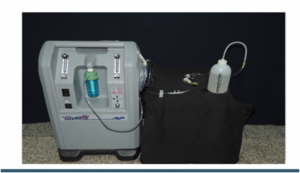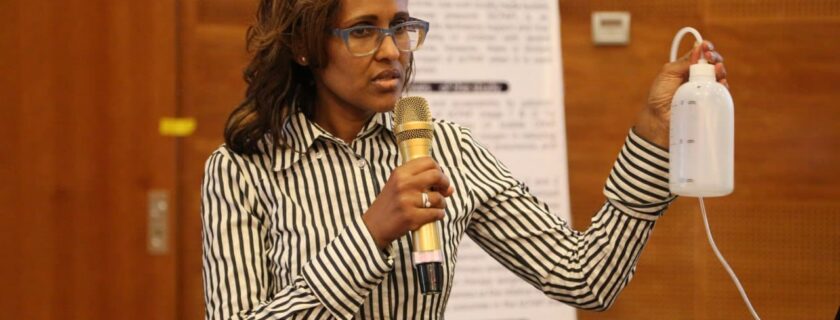A dissemination seminar on the Study of Bubble Continuous Positive airway pressure (BCPAP) for the treatment of severe pneumonia in young children in Ethiopia has successfully been held with various representatives from the Ministry of Health (MoH), Regional Health Bureaus (RHBs), participating medical hospitals, pediatricians and other pertinent stakeholders.
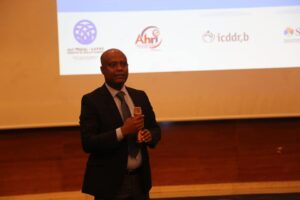 Dr. Alemseged Abdissa, AHRI Deputy Director General, while delivering a welcoming speech applauded the collaborative efforts done by AHRI, icddr,b and Sida (project funder) in reducing the plight of the infectious disease, pneumonia, which in Ethiopia contributes to about 17 percent in all deaths among under five children.
Dr. Alemseged Abdissa, AHRI Deputy Director General, while delivering a welcoming speech applauded the collaborative efforts done by AHRI, icddr,b and Sida (project funder) in reducing the plight of the infectious disease, pneumonia, which in Ethiopia contributes to about 17 percent in all deaths among under five children.
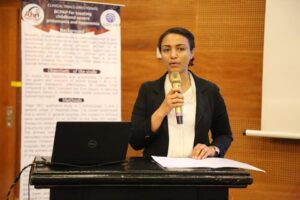 Dr. Meseret Zelalem, Maternal, Child and adolescent Health Lead Executive at MoH, on behalf of the Health Ministry thanked AHRI, icddr,b, and Sida on the exemplary partnership that seeks to lower the burden of pneumonia, which in Ethiopia claims the lives of nearly 36,000 children every year. For the success of the low cost locally made BCPAP, she underlined that technical support (capacity building) and resource mobilization is vital in scaling up the innovation for national use. Dr. Meseret commended all those working in the child health ecosphere in the country and echoed that synergetic partnerships are required to adopt the innovation which substantially reduces mortality in children with severe pneumonia and hypoxemia.
Dr. Meseret Zelalem, Maternal, Child and adolescent Health Lead Executive at MoH, on behalf of the Health Ministry thanked AHRI, icddr,b, and Sida on the exemplary partnership that seeks to lower the burden of pneumonia, which in Ethiopia claims the lives of nearly 36,000 children every year. For the success of the low cost locally made BCPAP, she underlined that technical support (capacity building) and resource mobilization is vital in scaling up the innovation for national use. Dr. Meseret commended all those working in the child health ecosphere in the country and echoed that synergetic partnerships are required to adopt the innovation which substantially reduces mortality in children with severe pneumonia and hypoxemia.
Moreover, during the dissemination workshop, an experience sharing session was had where both lead researchers from AHRI and icddr,b made presentations on the innovative oxygen delivery system.
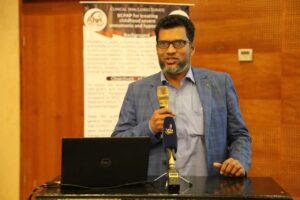 Dr. Mohammod Jobayer Chisti, whilst sharing Bangladesh’s experience on the oxygen therapy sensitized on the need of the innovation to be used at scale in Ethiopia. “The bubble CPAP has not been rigorously evaluated in developing countries, especially there were no RCT to evaluate the efficacy of the BCPAP oxygen therapy compared to WHO recommended low flow oxygen therapy beyond the neonatal period,” Dr. Mohammod elaborated on the knowledge gap that eventually led the research team to conduct a systematic review, which then spurred the research team to develop affordable and sustainable means to reducing the deaths in children caused by pneumonia and hypoxemia. As he explains, the BCPAP, which is an inexpensive(<2USD) method in providing oxygen support, is currently being used in Bangladesh as a standard of care. He echoed that the same should be done in Ethiopia at scale following the successful clinical trials done in the country across 15 hospitals.
Dr. Mohammod Jobayer Chisti, whilst sharing Bangladesh’s experience on the oxygen therapy sensitized on the need of the innovation to be used at scale in Ethiopia. “The bubble CPAP has not been rigorously evaluated in developing countries, especially there were no RCT to evaluate the efficacy of the BCPAP oxygen therapy compared to WHO recommended low flow oxygen therapy beyond the neonatal period,” Dr. Mohammod elaborated on the knowledge gap that eventually led the research team to conduct a systematic review, which then spurred the research team to develop affordable and sustainable means to reducing the deaths in children caused by pneumonia and hypoxemia. As he explains, the BCPAP, which is an inexpensive(<2USD) method in providing oxygen support, is currently being used in Bangladesh as a standard of care. He echoed that the same should be done in Ethiopia at scale following the successful clinical trials done in the country across 15 hospitals.
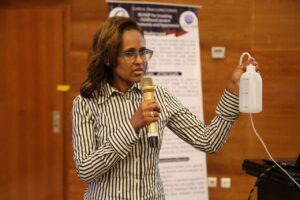 Dr. Meseret Gebre, BCPAP Research Lead at AHRI, through her presentation titled, ‘Bubble CPAP effectiveness trial in Ethiopia: a pragmatic cluster randomized controlled clinical trial,’ cited that the study was conducted in two stages with the purpose of the first stage being to evaluate the feasibility and acceptability of the study whilst the second stage was to study the effectiveness of the BCPAP. As she indicated, the first stage was conducted in St. Paul’s and Yekatit 12 hospital referral hospitals and Bishoftu and Butajira general hospitals whereas the second stage was conducted in 12 general hospitals in different regions in Ethiopia which are randomized to BCPAP and Low flow arm.
Dr. Meseret Gebre, BCPAP Research Lead at AHRI, through her presentation titled, ‘Bubble CPAP effectiveness trial in Ethiopia: a pragmatic cluster randomized controlled clinical trial,’ cited that the study was conducted in two stages with the purpose of the first stage being to evaluate the feasibility and acceptability of the study whilst the second stage was to study the effectiveness of the BCPAP. As she indicated, the first stage was conducted in St. Paul’s and Yekatit 12 hospital referral hospitals and Bishoftu and Butajira general hospitals whereas the second stage was conducted in 12 general hospitals in different regions in Ethiopia which are randomized to BCPAP and Low flow arm.
Whilst providing an insight on the study, Dr. Meseret highlighted the key findings as;
- According to the feasibility study in tertiary and general hospitals, BCPAP use was easy to use, feasible and acceptable by both clinicians and parents/caregivers.
- The cluster randomized trial done in 12 general hospitals in Ethiopia found that children receiving low cost locally made bCPAP had 76% lower probability of treatment failure and 86% lower probability of deaths than children receiving standard LF oxygen therapy.
- BCPAP oxygen therapy is not found to be associated with significant side effects.
She underlined that the priority and interventions required are to:
- Ensure availability of adequate equipment ( pulse oximeter, oxygen concentrator, nasal prongs, BCPAP bottles).
- Ensure adequate oxygen supply.
- Scale up BCPAP in general hospitals.
- Conduct operational research by research organizations to generate further evidence.
Dr. Meseret also underscored that the implications of the findings showed that;
- Improved delivery of oxygen will be critical to achievement of a major reduction of pneumonia mortality in children worldwide.
- The growing body of evidence on the clinical impact of bCPAP oxygen therapy from lower- and middle-income countries in Asia and sub-Saharan Africa argues for making bCPAP a routine component of care for severe pneumonia and hypoxemia globally.
- Routine use of bCPAP in children with severe pneumonia and hypoxemia is beneficial in general hospitals staffed by pediatricians.
- The findings give optimism for the possibility that countrywide scale-up of bCPAP in Ethiopia will be possible and impactful.
During the seminar, a reflective discussion session was had with the meeting being closed off by a recognition ceremony in appreciation of the relentless efforts of the RHBs and 15 general hospitals who made the clinical trial a success.
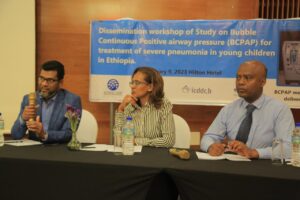

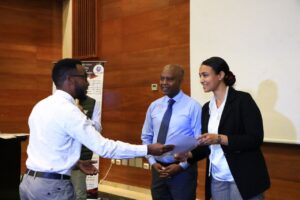
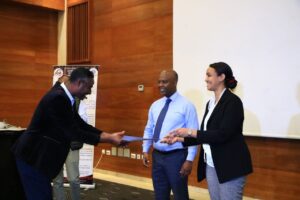
The clinical trial team at AHRI appreciates the support rendered by Sida in funding the project and the MoH’s support through the Grand Challenges Ethiopia as well as the strong partnership forged with the icddr,b.
